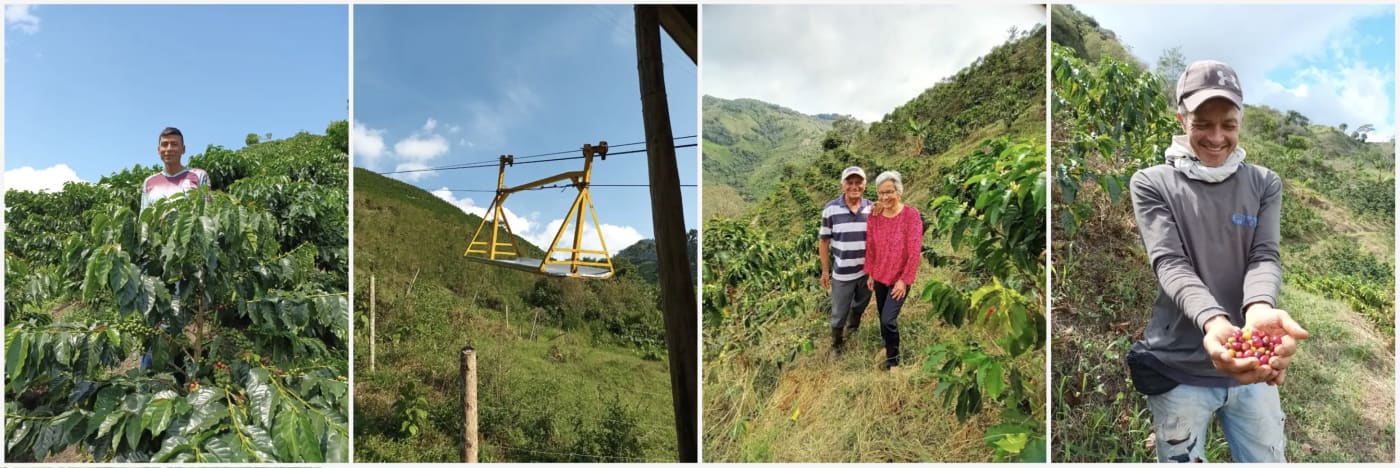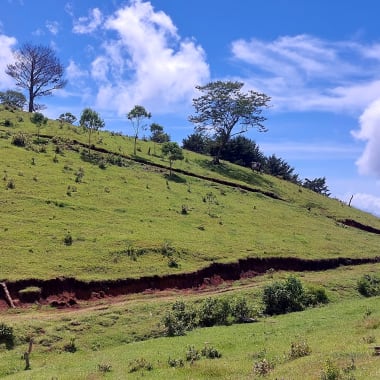-
Farm/Coop
-
La Virgen
-
Country
- Colombia
-
Altitude
-
1400-2000m above sea level
-
Varieties
-
Caturra, V.Colombia, and Castillo
-
Process
-
Importer
-
Caravela
-
Roast style
Colombia
La Virgen
Decaf Project By James HoffmanJames Hoffman and Caravela selected this cooperative-produced washed lot for the Decaf Project, a one-off event bringing together roasters and brewers to explore decaffeination processes. The tasting set contains the same coffee in 4 versions: 1 caffeinated (unprocessed) and 3 decaffeinated (EA Natural, CO2 Subcritical, Swiss Water®).
We are one of the few Australian roasters getting involved with this project. We’ll be roasting all samples with our Loring Kestrel S35, using an omni profile that we’ve specifically designed for each process variation.
→ Learn more about this project on our journal, the Decaf Project site and James Hoffmann’s YouTube channel.
About the decaf processes
1. Ethyl Acetate (EA) Decaffeination Process (by Coffein Compagnie)
Ethyl acetate is used in decaffeination because it is highly selective with respect to caffeine and can physically extract it from green coffee beans in a gentle, but targeted manner.
First, the green coffee beans are steamed to remove the silverskin and increase their water content, opening up their cell structure. The water-ethyl acetate-solution selectively extracts caffeine from the beans in several stages. Finally, steam is used to remove any remaining ethyl acetate from the beans, which are then dried to their original moisture content.
Ethyl Acetate is a natural component of sugar cane, coffee, and fruits such as musk, strawberries and bananas, but is also produced synthetically.
2. Natural Carbonic™ (previously referred to as CO2 Subcritical) Decaffeination Process (by CR3-Kaffeeveredelung M. Hermsen)
This unique process was developed by CR3 in the late 80s. It uses natural carbon dioxide, under subcritical conditions (i. e. relatively low temperature and pressure), to gently and selectively target caffeine, so as to retain the full taste potential of the green coffee. This process is all organic certified.
Raw, unroasted coffee is moistened and placed in a vessel with pressurized liquid carbon dioxide, which circulates through the coffee to extract caffeine. Once the desired caffeine level is achieved, the CO2 circulation stops, and the coffee is gently dried to its original moisture content. The caffeine is extracted from the liquid carbon dioxide, allowing both components to be reused.
3. Swiss Water® Decaffeination Process
The Swiss Water® Process uses water, temperature, and time to gently remove caffeine, while preserving all the coffee’s original characteristics.
The green coffee, rehydrated to the target moisture level for decaffeination, is put into contact with a Green Coffee Extract (GCE). GCE is made out of fresh water and all of the soluble solids within coffee (minus the caffeine). The GCE is continuously circulated around the green coffee, triggering the diffusion process, which removes only the caffeine (the only element of imbalance) and none of the flavor components of the coffee. The process takes place over 8-10 hours until there’s no more than 0.1% of caffeine remaining. Caffeine is then removed from the GCE using a proprietary carbon filtration system, so that the GCE can be reused.


About La Virgen and its connection with Caravela (the coffee importers)
Guadalupe is a small, picturesque municipality in Huila, nestled along the skirts of the Eastern Cordillera of Colombia. Since its founding, Guadalupe has been deeply shaped by Catholic tradition, with priests and devoted individuals playing a key role in its history. On December 12, 1715, Francisca Salazar, the daughter of a wealthy Spanish landowner, Francisco de Salazar, donated three hectares of her family’s hacienda to establish a town in honor of the Virgin of Guadalupe, whom she worshipped. This land became home to an important church, surrounded by houses that soon formed the town of La Viciosa.
In 1827, tragedy struck when a massive earthquake destroyed the town. However, with the same resilience that defines its people today, the town was rebuilt a year later and renamed “Guadalupe.”
Guadalupe is blessed with an abundance of water sources, including the Suaza River, which nourishes the fertile lands and sustains both the community and its agricultural bounty. The region’s water supply, combined with fresh, cool weather, creates ideal conditions for growing high-quality crops. Today, the hardworking people of Guadalupe make their living through cattle farming, river fishing, and cultivating crops like corn, beans, citrus fruits, and, most notably, coffee – one of the area’s most valuable resources.
Coffee is grown in the remote highlands surrounding the town, at ideal elevations between 1,400 and 2,000 meters above sea level. These high-altitude farms benefit from nutrient-rich soils, cool breezes, and abundant rainfall, all of which contribute to exceptional coffee production.
In 2013, Caravela began working with the coffee growers of Guadalupe. At that time, producers traveled to our purchasing station in Pitalito to deliver their coffee. Recognizing the potential of this coffee-growing region and its remote location, Caravela established a purchasing station in Guadalupe to be closer to these dedicated farmers.
At the heart of this station is a commitment to quality. A skilled quality analyst carefully evaluates each lot of coffee, while a PECA technician works directly with farmers to improve both quality and sustainability. Today, this station primarily receives coffee from the highlands of Guadalupe and neighboring Suaza, supporting a community of growers who are deeply committed to producing exceptional coffee that embodies the rich traditions and abundant natural resources of their homeland.
The producers
Coffee growers in Guadalupe are very traditional coffee growers. They work with their families and their communities to grow and produce coffee how they’ve learned through their lives from their parents and grandparents. Additionally, coffee growers in this region are very committed to the environment, some of them having achieved the Rainforest Certification. Each farm has their own wet mill and drying infrastructure or at least one per family in which they all share their spaces. They own farms with average of 5 hectares. In the last few years, we’ve noticed an interest in improving their quality, changing some varieties and processes with the objective of achieving better quality for their coffee.
In Guadalupe, we work with many aging producers. However, many of the sons and daughters of these producers are stepping up to support and continue with the family traditions with greater energy, innovation and care for the environment.
The washed fermentation process
Coffee producers with whom we work in Guadalupe start their process with a manual and selective harvesting process. During the pickings, they try to get only the ripe cherries, or there are some that carry out a handsorting before de-pulping. After de-pulping, they do a fermentation of 16-36 hours, and then 2 or 3 washes. In some cases, we do see coffee growers doing cherry resting for between 18 and 36 hours in plastic bags or silos before de-pulping. The coffee is then dried under shade in covered facilities. Their drying process may vary depending on the farm characteristics and the weather conditions, but in average, drying in these farms take between 15 and 25 days. Then, they take their coffee to the purchasing station in the town to be analyzed by the Quality Analyst. Here it goes through a rigorous physical analysis first to measure moisture level, water activity and yield factor. After, it undergoes through the sensory analysis which will finally determine the quality grade of the coffee. Then, the coffee grower will bring the coffee to the warehouse to sell it depending on the feedback of the physical and sensory analysis. From the warehouse, the parchment coffee is sent to Caravela’s Dry Mill in Armenia where it is processed and sent to port.
Learn everything about this coffee:
Ethical, traceable sourcing
This page has all the sourcing information (variety, process, region, story, importer, and more) that our importers share with us, and give us permission to use.
The transparency helps us talk confidently about the quality and background of our product, and it helps you know exactly what you’re buying.
Learn more:
Coffee page transparency legend
Our coffee philosophy
Our business approach
Fresh harvest coffee
We only source and roast coffee from each country’s latest harvest season (so the green coffee is never older than 1 year from the time of picking, processing and packing). This ensures the sensory qualities are always at their peak and unaffected by excessive ageing.
Roasted for espresso and filter (best enjoyed black)
Roast style: omni. Omni roasts are designed to brew and taste great both as espresso and filter. Our omni single origins generally sit on Agtron values in the ~70-60 value range. So, technically, they are somewhere in the lighter side of the medium spectrum.
Designed for espresso and filter brewing. Best enjoyed black.
Learn more:
Our Loring Kestrel S35 roaster
Our roasting style and approach
Best brewed within days 15-49 post-roast
The ‘fresh is best’ saying doesn’t apply to coffee (contrary to popular belief). Waiting before opening and brewing your bag of whole coffee beans helps develop peak flavour and acidity.
But heads up: if you buy pre-ground coffee, brew it as soon as possible.
Learn more:
Our recommended brewing window
Try our custom brewing recipes
Our recipes and ratios are tailored to our coffee sourcing and roasting styles, bringing the best flavour and feel out of each coffee.
For pour over, immersion, and other filter brewing styles, check our brew guides.
For our espresso single origins, we recommend a coffee:yield ratio of 1:3:
- Dose: 20g ground coffee
- Yield: 60g espresso
- Total brew time: ~24-28 seconds
This is just a starting point! We encourage you to experiment, taste, and adjust to find the recipe that you enjoy the most.
Learn more:
Our espresso brew guide (single origin)
Brewing ratio calculator
Packaging and sustainability
- Bags: ABA-certified home compostable (AS 5810-2010)
- Labels: recyclable
- Valves (only on +250g bags): general waste
- Box and tape (online orders): recyclable
Learn more:
Our packaging
Varieties
Castillo variety
Castillo is named after the researcher Jamie Castillo, who helped develop the varietal in 2005 by Cenicafe, Colombia’s coffee research centre
Caturra variety
Caturra is a natural mutation of Bourbon that was originally discovered in Brazil in 1937, considered to be the first naturally occurring mutation ever discovered.
V.Colombia variety
Also known as “Variedad Colombia”, this varietal was developed by Colombian researchers at Cenicafe by crossing Caturra and Timor Hybrid
The location
Coffee from Colombia
Colombia is one of the largest coffee producers in the world and benefits greatly from having one of the most unique and complex set of micro-climates of all coffee producing nations.
The Huila region of Colombia
This region boasts the perfect combination of high quality soil and geography and is quickly becoming one of the largest coffee producing regions in Colombia. One of the best regarded regions for high quality, fruit driven coffee.
Farm processes
Washed process
Machines are used to remove the flesh from the coffee cherry before being fermented in water, washed again, and finally sun dried. This process tends to result in more distinct, cleaner flavours.

Subscribe to a world of coffee
Discover a new single origin coffee from Sample every 1-5 weeks with no delivery fees.
No up-front purchase, and you can pause, cancel, or change plans at any time.
Available to order online this week:

Mexico Isavel Lopez Pablo
Flavours of sugarcane, dried cranberry, white peach
Body Acidity
Washed Typica
April 2025 harvest
Roasted omni for filter and espresso
Mexico Isavel Lopez Pablo online
Peru Miguel Estela
Flavours of honeydew melon, white grape, marmalade
Body Acidity
Washed Marshell
August 2025 harvest
Roasted omni for filter and espresso
Peru Miguel Estela online
El Salvador Manuel Castañeda
Flavours of toffee apple, cranberry, dulce de leche
Body Acidity
Honey Pacamara
March 2025 harvest
Roasted omni for filter and espresso
El Salvador Manuel Castañeda online
Ethiopia Tadese Teko
Flavours of bergamot, mandarin, mango
Body Acidity
Washed Ethiopian Heirloom
January 2025 harvest
Roasted omni for filter and espresso
Ethiopia Tadese Teko online